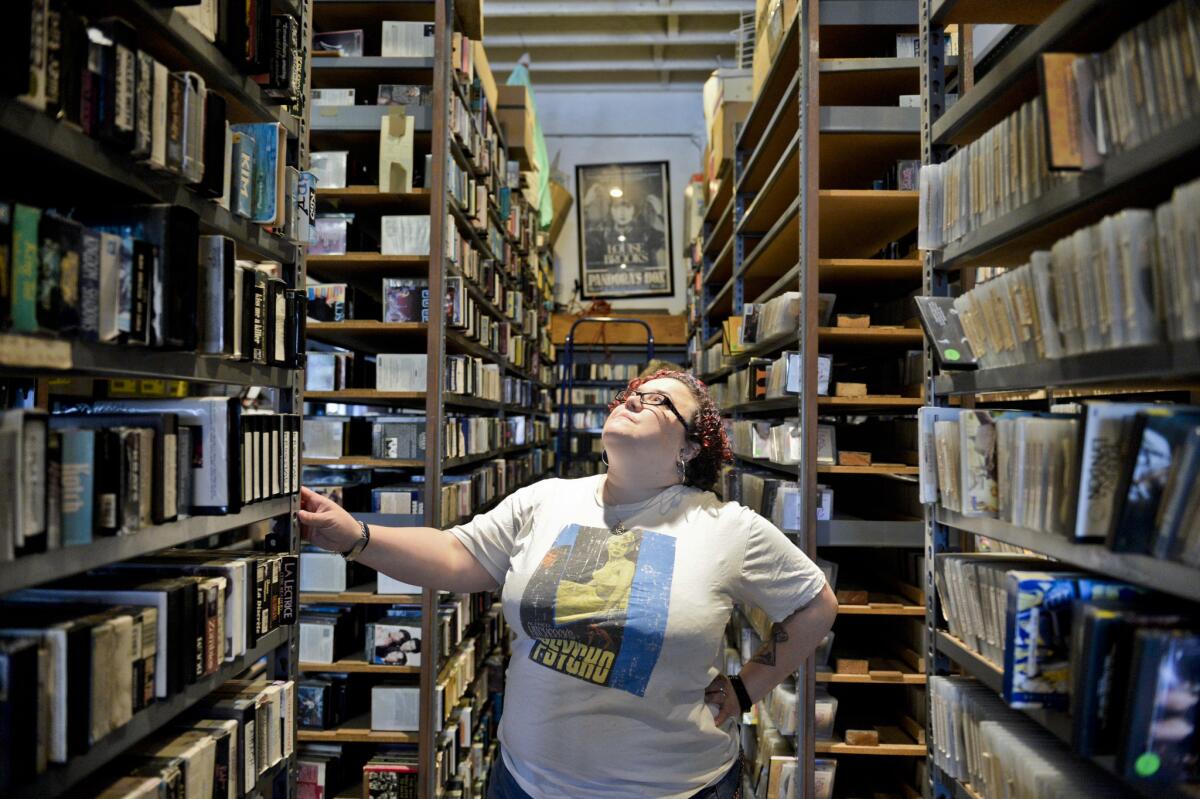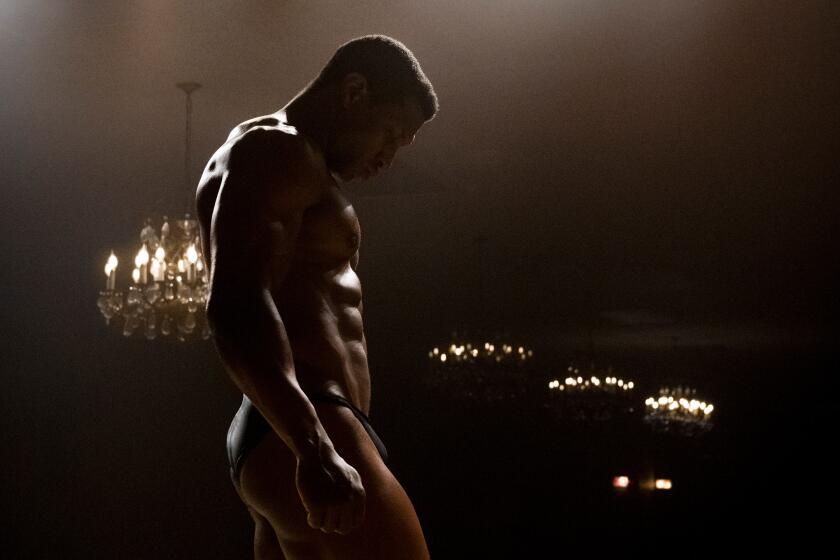Vidiots struggles to survive with biker films, cult classics and stuff you’ve never heard of

A long time ago in an era of VCRs and DVD players... The independent video store was a place of happenstance and wonder, a domain of cinephiles. Standing defiantly near a bowling alley on Pico Boulevard in Santa Monica is VIDIOTS, one of the last of
- Share via
So quaint it once was, rummaging through a smoky aisle for something by Godard or Truffaut and bumping into a guy — a pale creature with night eyes and a bag of take-out — who knew every frame Fellini and Kubrick ever shot and how Hitchcock blocked out scenes with a mapmaker’s precision.
The independent video store was a place of happenstance and wonder, a domain of cinefiles and would-be directors who read Pauline Kael and loved spouting off about cinéma vérité and surrealism. That era is largely gone, the casualty of streaming, multi-media platforms and a society that regards the VHS tape as kitsch from an age of big hair and bad music.
Standing defiant near a bowling alley a few blocks from the beach on Pico Boulevard in Santa Monica is Vidiots. Founded in 1985 by Cathy Tauber and Patty Polinger, the video store, which has more than 50,000 titles, 11,000 of them in VHS format, almost went out of business in 2015. Crowd-sourcing, benefactors and customers, including the Coen brothers and Tim Robbins, have supported and helped rescue the nonprofit.
But the future remains dicey, if not perilous.
“Money coming in from rentals is really declining, ” said Tauber.
“We’re bleeding, hemorrhaging,” said Polinger. “It’s really been quite biblical here over the years. Fire. Earthquakes. Two break-ins through the roof. Three snakes, including a python.”
“The DVR hurt us more than Netflix,” said Tauber, who noted rentals have dropped from 3,300 per week in 2006 to 750 per week today. “Suddenly, there was all this good TV.”
“Computers don’t have disc drives anymore,” said Polinger.
Words overlapped and curled into one another. Tauber and Polinger were reminiscent of “Thelma & Louise,” if the trailblazing outlaws had aged and not driven off a cliff in an iconic cinematic moment. They met at a nursery school near Beverlywood in 1956. Tauber grew up and worked for Frank Zappa; Polinger did a stint in theatrical distribution for MGM/UA Entertainment. They reconnected and thought about opening a yogurt shop or making jewelry. They decided on renting videos out of a store with a black and purple floor that conjured the galactic.
“We were completely underfunded,” said Tauber, whose sentences flit like small, hushed arrows.
“We started with 800 titles. The customers educated us,” said Polinger. “We’d go home and devour movies all night. We’d go to the Valley looking for really obscure stuff. We found a copy of Peter Weir’s ‘Picnic at Hanging Rock’ and thought we discovered buried treasure. There was no Internet back then. You had to search on your own.”

Independent video stores were plentiful in the 1980s, mixes of the bourgeois, the bohemian and, in back rooms of sheepish men, the carnal. They felt pressure from national chains, including Blockbuster, and later from DVRs, Internet streaming, the television renaissance and the re-invention of leisure time on social media. Many went the way of the record store and the newspaper in the upheaval of a technologically Darwinian world that evolved from “Mork & Mindy” to “Game of Thrones.”
Maggie Mackay understands that arc. A child of New York City, she frequented art-house theaters with her mother and often took refuge in a video store in the SoHo district. Mackay moved to Los Angeles, studied film, worked for Sundance and the L.A. Film Festival and is now Vidiots’ executive director. She concentrates on crowd-sourcing, screenings, curating, highlighting little-known directors and, with Tauber and Polinger, organized a fundraiser last month at the Ace Hotel honoring Harry Dean Stanton.
“We’re not trying to keep a video store open in 2016 because we’re nostalgic,” said Mackay, adding that recent fundraising efforts brought in $70,000 for salaries, rent, education programs and other costs. “We want to remind people that there’s a healthy and inclusive community that grows out of film libraries. The master filmmaker, the cinephile and the 4-year-old looking for a cartoon are all welcome here.”
The window drawings and aquamarine bricks of the store, once home to a bail bondsman, suggest that “Roger Rabbit” may be holed up inside with “The Little Mermaid” in a screenplay concocted by Woody Allen or Mel Brooks. Vidiots’ customers include store members, filmmakers looking for original source material and film buffs who discovered a director while streaming and want to see his or her earlier work.
Wandering the aisles, one feels the pull of time amid works by Cukor, Capra and Huston. Biker and cult films beckon near metal shelves of dusty VHS tapes with titles such as “Lying Lips”, “The Magnificent Brutes of the West” and “The H-Bomb and Other Smash Hits: Learning to Live with Nuclear Warfare.” Walls are lined with autographed VHS boxes: Terrence Malick, “Badlands”; Elliott Gould, “The Long Goodbye.”
Two archivists — Polinger called them “savant types who can identify rare stuff” — come a couple times a week to archive the VHS catalog and see what films were never digitized. One that hasn’t made the transition is John Waters’ “Mondo Trasho.” Spike Jonze donated VHS tapes, and one suspects that “Rebel Girls,” a piece of video art from the 1980s about “body issues and women’s roles in society,” is not streaming.
Amber Sealey, an actress and director, discovered Vidiots as a kind of sanctuary after she graduated from UC Santa Cruz in 1996. “I didn’t know anybody in L.A. and I got a membership,” said Sealey, whose tastes ranges from Lars von Trier to Michael Winterbottom to Julia Roberts. “I was lonely and depressed and I’d go get a pie from Whole Foods and rent a bunch of videos and watch movies. Sometimes for days.”
Vidiots has featured Sealey, whose films include “No Light and No Land Anywhere” and “How to Cheat,” as part of its spotlight program on local independent filmmakers. Like libraries for books, Vidiots is an important repository for films, many of which may not be available on other formats, Sealey believes.
“They’re a really important part of this town’s film industry,” said Sealey. “Film schools should be taking their students to Vidiots.”
On a recent morning, stories rose and faded in the store like whispers over the decades. The leaky roof when customers shopped holding umbrellas. That time during the L.A. Riots in 1992 when the store rented 1,000 titles in a single day. “It was the most we ever did,” said Tauber. “People thought they might be quarantined for days.” There were those years when people drove many miles to get here to seek recommendations from 19 clerks on Kurosawa, Bergman and other filmmakers. Today, the store has two full-time and two part-time workers.
The women have remained steadfast, much like Amoeba Music, the record store in Hollywood that has refused to be turned into a relic. Before the store’s most recent fundraising, Vidiots was saved last year by donations from a long-time customer, Dr. Leonard M. Lipman, and Megan Ellison, whose production company, Annapurna Pictures, was behind “Zero Dark Thirty” and “American Hustle.”
“It’s a struggle to keep the doors open,” Polinger said. “But this is a place you can come in and discover things. I think people want to have human contact.”
See the most-read stories this hour »
Twitter: @JeffreyLAT
More to Read
Only good movies
Get the Indie Focus newsletter, Mark Olsen's weekly guide to the world of cinema.
You may occasionally receive promotional content from the Los Angeles Times.










